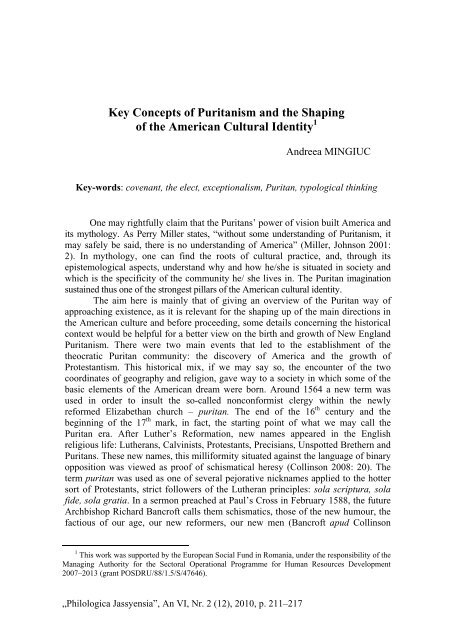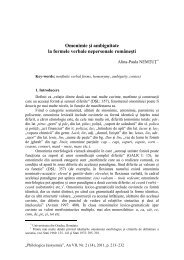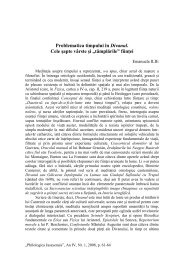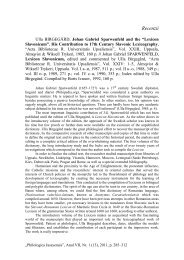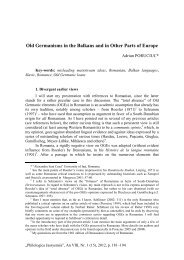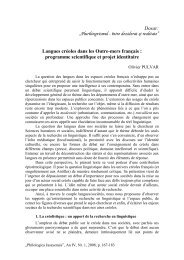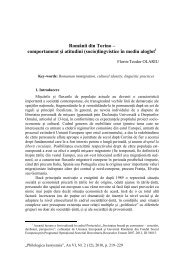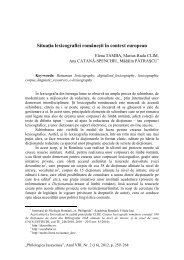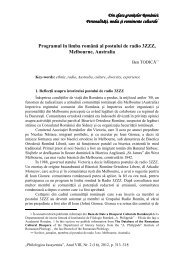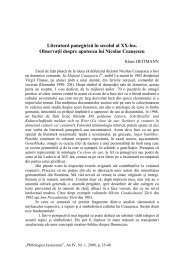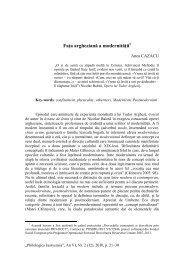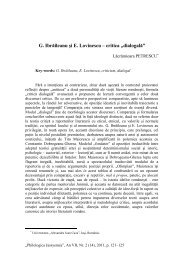Key Concepts of Puritanism and the Shaping of the American Cultural
Key Concepts of Puritanism and the Shaping of the American Cultural
Key Concepts of Puritanism and the Shaping of the American Cultural
Create successful ePaper yourself
Turn your PDF publications into a flip-book with our unique Google optimized e-Paper software.
<strong>Key</strong> <strong>Concepts</strong> <strong>of</strong> <strong>Puritanism</strong> <strong>and</strong> <strong>the</strong> <strong>Shaping</strong><br />
<strong>of</strong> <strong>the</strong> <strong>American</strong> <strong>Cultural</strong> Identity 1<br />
Andreea MINGIUC<br />
<strong>Key</strong>-words: covenant, <strong>the</strong> elect, exceptionalism, Puritan, typological thinking<br />
One may rightfully claim that <strong>the</strong> Puritans’ power <strong>of</strong> vision built America <strong>and</strong><br />
its mythology. As Perry Miller states, “without some underst<strong>and</strong>ing <strong>of</strong> <strong>Puritanism</strong>, it<br />
may safely be said, <strong>the</strong>re is no underst<strong>and</strong>ing <strong>of</strong> America” (Miller, Johnson 2001:<br />
2). In mythology, one can find <strong>the</strong> roots <strong>of</strong> cultural practice, <strong>and</strong>, through its<br />
epistemological aspects, underst<strong>and</strong> why <strong>and</strong> how he/she is situated in society <strong>and</strong><br />
which is <strong>the</strong> specificity <strong>of</strong> <strong>the</strong> community he/ she lives in. The Puritan imagination<br />
sustained thus one <strong>of</strong> <strong>the</strong> strongest pillars <strong>of</strong> <strong>the</strong> <strong>American</strong> cultural identity.<br />
The aim here is mainly that <strong>of</strong> giving an overview <strong>of</strong> <strong>the</strong> Puritan way <strong>of</strong><br />
approaching existence, as it is relevant for <strong>the</strong> shaping up <strong>of</strong> <strong>the</strong> main directions in<br />
<strong>the</strong> <strong>American</strong> culture <strong>and</strong> before proceeding, some details concerning <strong>the</strong> historical<br />
context would be helpful for a better view on <strong>the</strong> birth <strong>and</strong> growth <strong>of</strong> New Engl<strong>and</strong><br />
<strong>Puritanism</strong>. There were two main events that led to <strong>the</strong> establishment <strong>of</strong> <strong>the</strong><br />
<strong>the</strong>ocratic Puritan community: <strong>the</strong> discovery <strong>of</strong> America <strong>and</strong> <strong>the</strong> growth <strong>of</strong><br />
Protestantism. This historical mix, if we may say so, <strong>the</strong> encounter <strong>of</strong> <strong>the</strong> two<br />
coordinates <strong>of</strong> geography <strong>and</strong> religion, gave way to a society in which some <strong>of</strong> <strong>the</strong><br />
basic elements <strong>of</strong> <strong>the</strong> <strong>American</strong> dream were born. Around 1564 a new term was<br />
used in order to insult <strong>the</strong> so-called nonconformist clergy within <strong>the</strong> newly<br />
reformed Elizabethan church – puritan. The end <strong>of</strong> <strong>the</strong> 16 th century <strong>and</strong> <strong>the</strong><br />
beginning <strong>of</strong> <strong>the</strong> 17 th mark, in fact, <strong>the</strong> starting point <strong>of</strong> what we may call <strong>the</strong><br />
Puritan era. After Lu<strong>the</strong>r’s Reformation, new names appeared in <strong>the</strong> English<br />
religious life: Lu<strong>the</strong>rans, Calvinists, Protestants, Precisians, Unspotted Bre<strong>the</strong>rn <strong>and</strong><br />
Puritans. These new names, this milliformity situated against <strong>the</strong> language <strong>of</strong> binary<br />
opposition was viewed as pro<strong>of</strong> <strong>of</strong> schismatical heresy (Collinson 2008: 20). The<br />
term puritan was used as one <strong>of</strong> several pejorative nicknames applied to <strong>the</strong> hotter<br />
sort <strong>of</strong> Protestants, strict followers <strong>of</strong> <strong>the</strong> Lu<strong>the</strong>ran principles: sola scriptura, sola<br />
fide, sola gratia. In a sermon preached at Paul’s Cross in February 1588, <strong>the</strong> future<br />
Archbishop Richard Bancr<strong>of</strong>t calls <strong>the</strong>m schismatics, those <strong>of</strong> <strong>the</strong> new humour, <strong>the</strong><br />
factious <strong>of</strong> our age, our new reformers, our new men (Bancr<strong>of</strong>t apud Collinson<br />
1 This work was supported by <strong>the</strong> European Social Fund in Romania, under <strong>the</strong> responsibility <strong>of</strong> <strong>the</strong><br />
Managing Authority for <strong>the</strong> Sectoral Operational Programme for Human Resources Development<br />
2007–2013 (grant POSDRU/88/1.5/S/47646).<br />
„Philologica Jassyensia”, An VI, Nr. 2 (12), 2010, p. 211–217
Andreea MINGIUC<br />
2008: 22). Even if with a strong disapproval note, <strong>the</strong> Archbishop’s words highlight<br />
<strong>the</strong> essence <strong>of</strong> <strong>the</strong> new religious movement: newness <strong>and</strong> reformation. These two<br />
essential characteristics are present at <strong>the</strong> New Engl<strong>and</strong> Puritans. Their entrance in<br />
<strong>the</strong> 17 th century New Engl<strong>and</strong> has been viewed as <strong>the</strong> shaping force that moulded<br />
<strong>the</strong> very core <strong>of</strong> <strong>the</strong> <strong>American</strong> cultural identity. As Sacvan Bercovitch observes, in<br />
1630, <strong>the</strong> year <strong>of</strong> <strong>the</strong> journey on Arbella towards <strong>the</strong> godly promised New Canaan,<br />
<strong>the</strong>re were roughly three groups <strong>of</strong> puritans. The largest one believed in <strong>the</strong><br />
establishment <strong>of</strong> a commonwealth under Oliver Cromwell. The second group, <strong>of</strong> <strong>the</strong><br />
so-called separatists, was smaller <strong>and</strong> did not accept any authority, not even that <strong>of</strong><br />
<strong>the</strong> Protestant or Anglican Church in <strong>the</strong>ir attempt to reach <strong>the</strong> most pure form <strong>of</strong><br />
belief <strong>and</strong> religious life. Affirming <strong>the</strong>ir trust in <strong>the</strong> universal invisible church, <strong>the</strong>y<br />
were organised according to <strong>the</strong> model <strong>of</strong> <strong>the</strong> first Christian communities. From<br />
<strong>the</strong>se ones some remained in Engl<strong>and</strong> <strong>and</strong> some left for Amsterdam or <strong>the</strong> New<br />
World (<strong>the</strong> Plymouth Pilgrims). The third group, that <strong>of</strong> <strong>the</strong> Massachusetts Bay<br />
immigrants, combined <strong>the</strong> two ways in <strong>the</strong> effort <strong>of</strong> perfecting both (Bercovitch<br />
1988: 36). Their community <strong>of</strong> visible saints or <strong>the</strong> godly people was congregationalist<br />
in a federal covenant.<br />
The Puritans were visionary people <strong>and</strong> <strong>the</strong> endurance <strong>of</strong> <strong>the</strong>ir community<br />
was due to <strong>the</strong> power <strong>of</strong> <strong>the</strong> vision <strong>the</strong> expression <strong>of</strong> which was intimately linked<br />
with a great reliance on texts; <strong>the</strong> Puritan cultural identity was one <strong>of</strong> <strong>the</strong> words. As<br />
<strong>the</strong> already mentioned Sacvan Bercovitch explains, <strong>the</strong> rise <strong>of</strong> <strong>the</strong> so-called<br />
Gutenberg galaxy changed not only Europe but also <strong>the</strong> New Engl<strong>and</strong> Puritans, <strong>the</strong><br />
people <strong>of</strong> <strong>the</strong> Book, <strong>the</strong> believers <strong>of</strong> <strong>the</strong> sola scriptura doctrine. He also labels <strong>the</strong><br />
Puritan vision as “<strong>the</strong> first-begotten corporate <strong>of</strong>fspring <strong>of</strong> <strong>the</strong> printing press”<br />
(Bercovitch 1988: 34) <strong>and</strong> underlines <strong>the</strong> fact that <strong>the</strong> seventeenth century was a<br />
time <strong>of</strong> exp<strong>and</strong>ing, modifying, <strong>and</strong> revising <strong>of</strong> <strong>the</strong> Puritan identity by <strong>the</strong> way <strong>of</strong> <strong>the</strong><br />
word in rhetorical constructs as sermons, declarations, covenants, <strong>and</strong> thus<br />
transforming geography into Christiano-graphy.<br />
The fact that <strong>the</strong> Puritans were less <strong>and</strong> less favoured during Queen<br />
Elizabeth’s reign <strong>and</strong> at <strong>the</strong> beginning <strong>of</strong> <strong>the</strong> Stuarts’, had led, from <strong>the</strong>ir<br />
perspective, to a desecration <strong>of</strong> Engl<strong>and</strong>. The country, seen as a l<strong>and</strong> <strong>of</strong> corruption<br />
<strong>and</strong> abuse, was going to be deserted with <strong>the</strong> purpose <strong>of</strong> building a new, sacred<br />
historical context in which present <strong>and</strong> past would be endowed with meaning only<br />
in relation to <strong>the</strong> eschatological future. This desecration served, in fact, <strong>the</strong><br />
justification <strong>of</strong> <strong>the</strong> migration to <strong>the</strong> New World <strong>and</strong> led to establishing an<br />
eschatological <strong>and</strong> apocalyptical dimension for it. The Church <strong>of</strong> Engl<strong>and</strong> becomes<br />
a mirror image <strong>of</strong> that <strong>of</strong> Laodicea mentioned in <strong>the</strong> Book <strong>of</strong> Revelation. The<br />
Puritan migration is, in this context, a flight <strong>of</strong> <strong>the</strong> saint ones from corruption <strong>and</strong><br />
evil; it is an apocalyptical migration epitomized in <strong>the</strong> image <strong>of</strong> <strong>the</strong> Woman-in-<strong>the</strong>-<br />
Wilderness who appears in <strong>the</strong> twelfth chapter <strong>of</strong> <strong>the</strong> Book <strong>of</strong> Revelation. The<br />
Apocalypse is thus a guide through history, which becomes a revelatory event <strong>and</strong><br />
<strong>the</strong> reform is situated at <strong>the</strong> end <strong>of</strong> time. The religious migration represents, within<br />
<strong>the</strong> sacred history, <strong>the</strong> end <strong>of</strong> alienation from <strong>and</strong> <strong>the</strong> reconciliation with God, a<br />
prophetic, salvational moment that links sacred time with sacred space.<br />
The above-mentioned third group <strong>of</strong> Puritans set <strong>of</strong>f in 1630 for <strong>the</strong> great<br />
journey towards what was going to be <strong>the</strong>ir Canaan <strong>and</strong> a model <strong>of</strong> Christian charity<br />
212
<strong>Key</strong> <strong>Concepts</strong> <strong>of</strong> <strong>Puritanism</strong> <strong>and</strong> <strong>the</strong> <strong>Shaping</strong> <strong>of</strong> <strong>the</strong> <strong>American</strong> <strong>Cultural</strong> Identity<br />
for <strong>the</strong> entire world as John Winthrop, <strong>the</strong>ir spiritual leader, called <strong>the</strong> new<br />
establishment 2 . They had a mission to fulfil <strong>and</strong> thus, as Cotton Ma<strong>the</strong>r would later<br />
say, God was going „To <strong>the</strong>m first <strong>and</strong> <strong>the</strong>n By <strong>the</strong>m, give a specimen <strong>of</strong> many<br />
Good Things“(Ma<strong>the</strong>r apud Bercovitch 1997: 276). Even before reaching <strong>the</strong> shore,<br />
Winthrop pinpoints <strong>the</strong> principles, which were going to govern <strong>the</strong> life <strong>of</strong> <strong>the</strong><br />
Puritan community. As <strong>the</strong>-soon-to-be-governor puts it in his speech held in front <strong>of</strong><br />
<strong>the</strong> people on Arbella, <strong>the</strong> Puritan community <strong>of</strong> visible saints was to build a “city<br />
upon a hill” (Winthrop apud Bercovitch 1997: 194), a model society upon which<br />
<strong>the</strong> eyes <strong>of</strong> all people were going to be set, or ra<strong>the</strong>r those <strong>of</strong> Engl<strong>and</strong>, Holl<strong>and</strong>,<br />
Germany <strong>and</strong> o<strong>the</strong>r Protestant countries. Interestingly enough, Winthrop establishes<br />
a kind <strong>of</strong> social stratification, which would help maintaining social harmony;<br />
consequently, <strong>the</strong>re is not a question <strong>of</strong> equality, but <strong>of</strong> knowing where one’s place<br />
is. The religious support for this delimitation lies in <strong>the</strong> claim that God’s grace gives<br />
different gifts: love, mercy, gentleness, temperance to <strong>the</strong> great ones <strong>and</strong> faith,<br />
patience, <strong>and</strong> obedience to <strong>the</strong> poor <strong>and</strong> inferior (Winthrop apud Bercovitch 1997:<br />
194). Newness, freshness, <strong>and</strong> exceptionalism, but still not <strong>the</strong> same st<strong>and</strong>ards were<br />
applied to <strong>the</strong> various social statuses.<br />
In order to achieve <strong>the</strong>ir spiritual peak, <strong>the</strong>y had to be ready to fight <strong>and</strong><br />
eliminate any sign <strong>of</strong> evil by any means. In New Engl<strong>and</strong> <strong>the</strong> ultimate evil, <strong>the</strong><br />
devil, was <strong>the</strong> Indian; <strong>the</strong> savage <strong>and</strong> <strong>the</strong> wilderness beyond <strong>the</strong> frontier were<br />
Satan’s territory because <strong>the</strong>y were unknown, untamed <strong>and</strong> represented dark,<br />
harmful temptation. In fact, <strong>the</strong>ir mission was to struggle against <strong>the</strong> Antichrist in a<br />
l<strong>and</strong> that was <strong>the</strong> site <strong>of</strong> <strong>the</strong> Second Coming <strong>of</strong> Christ. Moreover, according to <strong>the</strong><br />
Puritan typological thinking, <strong>the</strong>y were <strong>the</strong> antitypes <strong>of</strong> <strong>the</strong> Old Testament Israel<br />
<strong>and</strong> Winthrop becomes thus a new Moses leading <strong>the</strong> chosen people to its rightful<br />
place. America was <strong>the</strong> New Canaan where God’s New people was called upon to<br />
found <strong>the</strong>ir commonwealth (Freese 1987: 11).<br />
Forefa<strong>the</strong>rs <strong>of</strong> what has become a famous concept, <strong>the</strong> <strong>American</strong> dream, <strong>the</strong><br />
Puritans <strong>of</strong> <strong>the</strong> Massachusetts Bay colony developed a doctrine <strong>of</strong> exceptionalism, a<br />
term that originates in <strong>the</strong>ir exodus from <strong>the</strong> Old World to <strong>the</strong> New one <strong>and</strong> <strong>the</strong><br />
distinction that was made between a civilized world that had become old, decadent,<br />
sterile, tyrannical, immobile <strong>and</strong> ano<strong>the</strong>r one that was new, creative, manly,<br />
vigorous, productive, free. Again, <strong>the</strong> analogy with <strong>the</strong> Israelites comes into<br />
discussion. God had told <strong>the</strong>m: „The Lord hath chosen <strong>the</strong>e to be a peculiar people<br />
unto Himself, above all <strong>the</strong> nations that are upon <strong>the</strong> earth“(De. 14:2). The Puritans,<br />
a society <strong>of</strong> <strong>the</strong> elect, a community <strong>of</strong> godly people was to finally achieve <strong>the</strong>ir<br />
dream in <strong>the</strong> Promised L<strong>and</strong> found in New Engl<strong>and</strong>, a l<strong>and</strong> that was rightfully<br />
<strong>the</strong>irs. The perspective marked by <strong>the</strong> concept <strong>of</strong> exceptionalism is, in fact,<br />
chronologically simultaneous with <strong>the</strong> birth <strong>of</strong> <strong>the</strong> idea <strong>of</strong> America <strong>and</strong> <strong>the</strong><br />
<strong>American</strong> national identity (Spanos 2007: 36).<br />
The chief principles according to which <strong>the</strong> social mechanism functioned<br />
stemmed from Calvinism <strong>and</strong> imposed a life perpetually marked by self-scrutiny<br />
<strong>and</strong> <strong>the</strong> endless search for signs <strong>of</strong> being elect. However, all <strong>the</strong> attempts were<br />
2 The expression was launched in John Winthrop‘s famous <strong>the</strong>sis A Model <strong>of</strong> Christian Charity<br />
written on board <strong>the</strong> Arbella in 1630.<br />
213
Andreea MINGIUC<br />
under <strong>the</strong> shadow <strong>of</strong> paradox <strong>and</strong> ambiguity: <strong>the</strong> ultimate sign <strong>of</strong> being elect was<br />
that <strong>of</strong> achieving material prosperity; it was only natural that <strong>the</strong> au<strong>the</strong>ntic Puritan<br />
wished for salvation <strong>and</strong> tried to find <strong>the</strong> good sign by working hard for financial<br />
success. Hence <strong>the</strong> contradiction: if worldly matters are so insignificant for spiritual<br />
evolution <strong>the</strong>n why is <strong>the</strong> struggle for material good <strong>the</strong> condition for reaching it?<br />
Fur<strong>the</strong>rmore, one <strong>of</strong> <strong>the</strong> two main Protestant principles – sola fide – emphasizes <strong>the</strong><br />
sufficiency <strong>of</strong> personal faith without supporting facts. That is how later <strong>the</strong><br />
<strong>American</strong> Dream was understood as a so-called from-rags-to-riches story, <strong>the</strong> story<br />
<strong>of</strong> reaching material prosperity as <strong>the</strong> ultimate value.<br />
A most significant characteristic <strong>of</strong> human beings, <strong>of</strong> human nature, one that<br />
touched any life aspect was, from Puritan perspective, that <strong>of</strong> innate depravity. As a<br />
consequence <strong>of</strong> Adam <strong>and</strong> Eve’s fall, everyone was essentially marked by<br />
corruption <strong>and</strong> perversity. It followed that no one was able to find salvation on<br />
his/her own; only God decided who was going to stay by His side. Related to this,<br />
<strong>the</strong> concept <strong>of</strong> unconditional election stressed upon <strong>the</strong> fact that God saved those he<br />
wished <strong>and</strong> this was directly connected to <strong>the</strong> idea <strong>of</strong> predestination. No one knew<br />
whe<strong>the</strong>r or not election was his/ her part; <strong>the</strong> only thing man could do was looking<br />
for signs <strong>and</strong> <strong>the</strong> most important <strong>of</strong> <strong>the</strong>se was, as mentioned before, material<br />
success. To this paradox <strong>of</strong> <strong>the</strong> materialistic way to heaven ano<strong>the</strong>r one adds – that<br />
<strong>of</strong> preparatonism; although a person could not earn grace <strong>and</strong> receive salvation, <strong>the</strong><br />
individual had to prepare for it by leading a righteous life. Still, <strong>the</strong> ones who<br />
received <strong>the</strong> signs <strong>of</strong> being predestined to salvation were under <strong>the</strong> danger <strong>of</strong><br />
backsliding – <strong>the</strong>y could at anytime fall into <strong>the</strong> previous sinful state. In order to<br />
prevent this, <strong>the</strong> Puritans were expected to pray constantly <strong>and</strong> watch over <strong>the</strong>ir<br />
souls day <strong>and</strong> night. Self-scrutiny obsessively appears in Puritan writings,<br />
especially diaries where one may read about <strong>the</strong> utter fear <strong>of</strong> letting oneself prey to<br />
temptation even unwillingly 3 . Self questioning recurrently <strong>and</strong> almost obsessively<br />
appears suggesting <strong>the</strong> pressure <strong>and</strong> <strong>the</strong> fear <strong>of</strong> being ab<strong>and</strong>oned by God, <strong>the</strong> fear <strong>of</strong><br />
failing <strong>and</strong> being cast out <strong>of</strong> <strong>the</strong> model community which did not afford <strong>the</strong> least<br />
sign <strong>of</strong> evil to interfere with its soteriological hopes. This is why it has been said<br />
that Puritan diaries writers are <strong>the</strong> forerunners <strong>of</strong> <strong>the</strong> psychological novels; what<br />
<strong>the</strong>y mainly deal with is not an external threat, but an internal one. As Perry Miller<br />
states, <strong>the</strong> Puritans “liberated men from <strong>the</strong> treadmill <strong>of</strong> indulgences <strong>and</strong> penances,<br />
but cast <strong>the</strong>m on <strong>the</strong> iron couch <strong>of</strong> introspection”(Miller 1953: 207).<br />
At <strong>the</strong> centre <strong>of</strong> what <strong>the</strong> New Engl<strong>and</strong> way meant laid <strong>the</strong> pastorally inspired<br />
covenant <strong>the</strong>ology that, as Paul E. Czuchlewski observed in his article, A<br />
Covenanted Nation, operated a shift from <strong>the</strong> rigid Calvinist system “by positing<br />
that God had entered into a direct covenant with His elect who were in consequence<br />
bound to special responsibilities” (Czuchlewski 1976: 454). The society was tuned<br />
according to three covenants. The covenant <strong>of</strong> works was <strong>the</strong> first one that God<br />
made with Adam in <strong>the</strong> Garden <strong>of</strong> Eden, it was a moral law; in return to perfect<br />
obedience man was to be rewarded with eternal life <strong>and</strong> happiness. Jesus Christ, as<br />
<strong>the</strong> representative <strong>of</strong> mankind, had fulfilled this covenant; still <strong>the</strong> Puritan concept<br />
<strong>of</strong> limited atonement claimed that He died only for <strong>the</strong> chosen ones, not for<br />
3 The Diary <strong>of</strong> Samuel Sewell is one <strong>of</strong> <strong>the</strong> most famous examples in this respect.<br />
214
<strong>Key</strong> <strong>Concepts</strong> <strong>of</strong> <strong>Puritanism</strong> <strong>and</strong> <strong>the</strong> <strong>Shaping</strong> <strong>of</strong> <strong>the</strong> <strong>American</strong> <strong>Cultural</strong> Identity<br />
everybody 4 . The second one, <strong>the</strong> covenant <strong>of</strong> grace, was based on God’s promise to<br />
send His spirit to <strong>the</strong> elect, to bring salvation to those who had been justified by<br />
Christ’s death. The third covenant, <strong>of</strong> redemption, which was pre-existent to that <strong>of</strong><br />
grace, was a pact between God <strong>the</strong> Fa<strong>the</strong>r <strong>and</strong> Christ in which <strong>the</strong> latter was to be<br />
accepted as <strong>the</strong> one paying for <strong>the</strong> sins <strong>of</strong> <strong>the</strong> true believers (Rutman 1977: 25). The<br />
concept <strong>of</strong> covenant was also applied to marriage from which all <strong>the</strong> o<strong>the</strong>r social<br />
covenants stemmed. It was viewed ra<strong>the</strong>r as a partnership between <strong>the</strong> two spouses<br />
<strong>and</strong> consequently, <strong>the</strong> woman was on an equal level with <strong>the</strong> man from this point <strong>of</strong><br />
view. What’s more, women were <strong>of</strong>ten viewed as being stronger in matters <strong>of</strong><br />
religious belief <strong>and</strong> influence. They were <strong>the</strong> ones supporting <strong>the</strong>ir husb<strong>and</strong>s’<br />
mission <strong>and</strong> maintaining a pr<strong>of</strong>ound relationship between family/community <strong>and</strong><br />
church 5 . Even if <strong>the</strong> Puritan society was a very strict one <strong>and</strong> ascribed clearly<br />
defined domestic roles to women, it gave some <strong>of</strong> <strong>the</strong> first women writers <strong>of</strong> whom<br />
Anne Bradstreet is a famous example. In addition, <strong>the</strong> birth <strong>of</strong> <strong>the</strong> first original<br />
<strong>American</strong> literary genre is due to women writers who recounted <strong>the</strong>ir experiences as<br />
captives in what is called captivity narrative 6 . One cannot speak about absolute<br />
interdiction or even repression <strong>of</strong> women in this respect no matter if <strong>the</strong> act <strong>of</strong><br />
writing was supervised by men <strong>and</strong> <strong>the</strong>y were <strong>the</strong> ones who mediated between <strong>the</strong><br />
writer <strong>and</strong> <strong>the</strong> readers 7 . Due to <strong>the</strong>se writings, <strong>the</strong> expression Puritan Founding<br />
Fa<strong>the</strong>rs has been faced with a question mark – <strong>the</strong> first generation Puritans were not<br />
only men, fa<strong>the</strong>rs, but also mo<strong>the</strong>rs, sisters, daughters many <strong>of</strong> whom left written<br />
accounts <strong>of</strong> <strong>the</strong>ir experience on <strong>the</strong> frontier <strong>and</strong> beyond it. Fur<strong>the</strong>rmore, <strong>the</strong> term<br />
founding supposes that <strong>the</strong> l<strong>and</strong> was not at all inhabited. Related to this, ano<strong>the</strong>r<br />
idea that also supported Puritan belief in assuming <strong>the</strong> right <strong>of</strong> taking l<strong>and</strong> from <strong>the</strong><br />
Indians was that <strong>of</strong> <strong>the</strong> Manifest Destiny. Even if present in people’s minds since<br />
<strong>the</strong> 17th century, it was coined later, in 1845, by <strong>the</strong> journalist John O’Sullivan<br />
when talking about <strong>the</strong> westward movement. As editor <strong>of</strong> <strong>the</strong> Democratic Review,<br />
he referred in his magazine to America’s “Manifest Destiny to overspread <strong>the</strong><br />
continent allotted by Providence for <strong>the</strong> free development <strong>of</strong> our yearly multiplying<br />
millions” (O’Sullivan 1845: 5) 8 .<br />
Even if <strong>the</strong>ir hope was strong <strong>and</strong> <strong>the</strong>ir determination absolute, <strong>the</strong> Puritans<br />
seemed to have been forgotten by Europe. They were left alone with <strong>the</strong>ir dream <strong>of</strong><br />
4 That is why <strong>the</strong>y believed that only a certain number <strong>of</strong> people were predestined to salvation.<br />
5 Never<strong>the</strong>less, certain borders had to be respected. Anne Hutchinson for example became a heretic<br />
in <strong>the</strong> eyes <strong>of</strong> <strong>the</strong> Puritan society after she had been previously received as an inspiration for <strong>the</strong><br />
community. The ministerial attitude <strong>of</strong> <strong>the</strong> time showed that even if Anne was endowed with a<br />
charisma resembling that <strong>of</strong> a religious leader she was but a woman <strong>and</strong> as a woman it was too difficult<br />
to maintain a balance.<br />
6 As Derounian – Stodola claims, “<strong>the</strong> Indian captivity narrative is arguably <strong>the</strong> first <strong>American</strong><br />
literary form dominated by women’s experiences as captives, story-tellers, writers <strong>and</strong> readers”<br />
(Derounian Stodola 1998: II). The most well known captivity narrative <strong>and</strong> <strong>the</strong> first one to be published<br />
<strong>and</strong> become a best seller was that <strong>of</strong> Mary Rowl<strong>and</strong>son which was published in 1682.<br />
7 As <strong>the</strong> Puritans were very suspicious regarding works <strong>of</strong> fiction, a certain control was needed <strong>and</strong><br />
only didactic texts with obvious religious communal function were accepted. Never<strong>the</strong>less, <strong>the</strong> texts<br />
maintain a subsidiary message that <strong>of</strong>fers a glimpse on various aspects <strong>of</strong> <strong>the</strong> political, <strong>the</strong> cultural, <strong>and</strong><br />
<strong>the</strong> social contexts at <strong>the</strong> time <strong>of</strong> <strong>the</strong>ir being written.<br />
8 The article was written in order to praise <strong>the</strong> annexation <strong>of</strong> Texas as sign <strong>of</strong> <strong>the</strong> <strong>American</strong><br />
forwarding civilizing force.<br />
215
Andreea MINGIUC<br />
salvation. That is why <strong>the</strong> second <strong>and</strong> third generation <strong>of</strong> Puritans embarked on <strong>the</strong><br />
mission <strong>of</strong> reviving <strong>the</strong> meaning <strong>of</strong> <strong>the</strong>ir society by uniting, in Bercovitch’s words<br />
„geography, textuality <strong>and</strong> <strong>the</strong> spirit in what amounted to a new symbology, centred<br />
on <strong>the</strong> vision <strong>of</strong> America” (Bercovitch 1988: 38) 9 . At this point it is worth<br />
mentioning that one <strong>of</strong> <strong>the</strong> most important aspects regarding <strong>the</strong> issue <strong>of</strong> <strong>American</strong><br />
identity is that while o<strong>the</strong>rs fled/ went to <strong>the</strong> New World <strong>and</strong> established<br />
communities which tried to re-construct Europe (New France, Nova Scotia, New<br />
Spain) <strong>and</strong> invade <strong>the</strong> l<strong>and</strong> <strong>of</strong> inferior peoples, <strong>the</strong> Puritans on Arbella felt entitled<br />
to <strong>the</strong> whole New World because it had been promised to <strong>the</strong>m by God. They were<br />
<strong>the</strong> true people <strong>of</strong> this l<strong>and</strong> <strong>and</strong> <strong>the</strong> ones who endowed it with a specific mythology.<br />
The hill on which <strong>the</strong> community <strong>of</strong> <strong>the</strong> New Israel, <strong>of</strong> <strong>the</strong> elect, was established<br />
<strong>and</strong> thus <strong>the</strong>ir err<strong>and</strong> fulfilled, was directly connected to <strong>the</strong> biblical images <strong>of</strong><br />
Ararat, Sinai, Golgotha, <strong>and</strong> <strong>the</strong> Holy Mountain <strong>of</strong> <strong>the</strong> New Jerusalem (Bercovitch<br />
1974: 7). This gives an eschatological dimension to <strong>the</strong> Puritan visionary<br />
perspective <strong>the</strong> <strong>of</strong>fspring <strong>of</strong> which was America as metaphor <strong>and</strong> site for salvation.<br />
The o<strong>the</strong>r peoples had <strong>the</strong>ir roots, <strong>the</strong>ir mythologies <strong>and</strong> stories in <strong>the</strong> human<br />
history whereas <strong>the</strong> Puritans’ history had been written in <strong>the</strong> Bible <strong>and</strong> transcended<br />
human history. That is why America was for <strong>the</strong>m <strong>the</strong> ultimate way to salvation, <strong>the</strong><br />
last corner <strong>of</strong> <strong>the</strong> world that God left undiscovered until His chosen people was<br />
ready to go <strong>and</strong> inhabit it <strong>and</strong> fulfil <strong>the</strong>ir destiny.<br />
To sum up, we may say that <strong>the</strong> mark that Puritan thinking left on <strong>the</strong><br />
<strong>American</strong> culture has concretized as follows: first, it created a specific mythology;<br />
secondly, it mixed up economical or/ <strong>and</strong> national ideals with <strong>the</strong> religious ones,<br />
<strong>and</strong> thirdly it maintained, due to <strong>the</strong> stubborn faithfulness to <strong>the</strong> initial dream, a gap<br />
between history <strong>and</strong> rhetoric, fact <strong>and</strong> idea, reality <strong>and</strong> dream. This gap was going<br />
to be a battlefield for writers like Hawthorne, Melville, <strong>and</strong> Thoreau.<br />
Bibliography<br />
Bercovitch 1974: Sacvan Bercovitch (ed.), The <strong>American</strong> Puritan Imagination. Essays in<br />
Revaluation, New York, Cambridge University Press.<br />
Bercovtich 1988: Sacvan Bercovtich, The Puritan Vision <strong>of</strong> <strong>the</strong> New World, in Emory Elliott,<br />
(gen. ed.), Columbia Literary History <strong>of</strong> <strong>the</strong> U.S., Ney York, Columbia University<br />
Press, pp. 33–44.<br />
Bercovitch 1997: Sacvan Bercovitch (gen. ed.), The Cambridge History <strong>of</strong> <strong>American</strong><br />
Lliterature, Vol. I, Cambridge, Cambridge University Press.<br />
Collinson 2008: Patrick Collinson, Antipuritanism, in John C<strong>of</strong>fey, Paul C.H. Lim (eds.),<br />
Cambridge, Cambridge University Press, pp. 33–44.<br />
Czuchlewski 1976: Paul E. Czuchlewski, A Covenanted Nation, in “America”, May 22, pp.<br />
454–455.<br />
Derounian-Stodola 1998: Kathryn Zabelle Derounian-Stodola, ed., Women’s Indian<br />
Captivity Narratives, New York, Penguin Books.<br />
9 Ano<strong>the</strong>r literary genre, bearer <strong>of</strong> <strong>the</strong> rich Puritan rhetoric, flourishes in New Engl<strong>and</strong> in this<br />
period – <strong>the</strong> jeremiad which presents <strong>the</strong> time <strong>of</strong> misfortune as a punishment for <strong>the</strong> evils done by <strong>the</strong><br />
society; at <strong>the</strong> same time, it brings up <strong>the</strong> idea <strong>of</strong> hope in a better future by meditating on <strong>the</strong> spirit <strong>of</strong><br />
<strong>the</strong> glorious past.<br />
216
<strong>Key</strong> <strong>Concepts</strong> <strong>of</strong> <strong>Puritanism</strong> <strong>and</strong> <strong>the</strong> <strong>Shaping</strong> <strong>of</strong> <strong>the</strong> <strong>American</strong> <strong>Cultural</strong> Identity<br />
Freese 1987: Peter Freese, The <strong>American</strong> Dream <strong>and</strong> <strong>the</strong> <strong>American</strong> Nightmare: General<br />
Aspects <strong>and</strong> Literary Examples, Paderborner Universitätsreden 7. Paderborn, Universität-<br />
Gesamthochschule.<br />
Holy Bible, King James Version, Nashville, Royal Publishers, Inc., 1971.<br />
Miller 1953: Perry Miller, R<strong>of</strong>er Williams: His Contribution to <strong>the</strong> <strong>American</strong> Tradition, New<br />
York, Bobbs-Merrill.<br />
Miller, Johnson 2001: Perry Miller, Thomas H. Johnson (eds.), The Puritans. A Sourcebook<br />
<strong>of</strong> Their Writings, Toronto, General Publishing Company, Ltd.<br />
O'Sullivan 1845: John O'Sullivan, Annexation, in “United States Magazine <strong>and</strong> Democratic<br />
Review” 17, July-August 1845, no 1, pp. 5–10.<br />
Rutman 1977: Darret B. Rutman, <strong>American</strong> <strong>Puritanism</strong>, New York: WW Norton & Company Inc.<br />
Spanos 2007: William V. Spanos, <strong>American</strong> Exceptionalism, <strong>the</strong> Jeremiad, <strong>and</strong> <strong>the</strong> Frontier:<br />
From <strong>the</strong> Puritans to <strong>the</strong> Neo-Con-Men, in “Boundary”, 2007, no. 2, Spring, pp 35–66.<br />
Abstratct<br />
The 17 th Puritan thinking <strong>and</strong> way <strong>of</strong> approaching various layers <strong>of</strong> existence<br />
constitute <strong>the</strong> foundation for what was going to be <strong>the</strong> <strong>American</strong> world view. The key<br />
concepts that governed <strong>the</strong> life <strong>of</strong> <strong>the</strong> Puritan community pervaded <strong>the</strong> social, political as<br />
well as cultural life <strong>and</strong> this makes <strong>the</strong>m essential for <strong>the</strong> analysis <strong>of</strong> what is now <strong>the</strong><br />
<strong>American</strong> identity. Fur<strong>the</strong>rmore, in a time <strong>of</strong> post isms, if we may say so, <strong>the</strong> idea <strong>of</strong> <strong>the</strong><br />
Puritan dream comes to reinforce <strong>the</strong> hope in <strong>the</strong> resources <strong>of</strong> <strong>the</strong> human being within a<br />
community.<br />
“Alex<strong>and</strong>ru Ioan Cuza” University, Iasi<br />
Romania<br />
217


